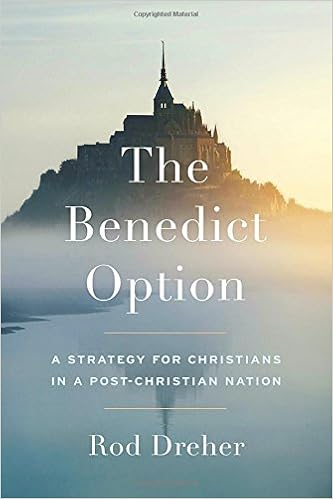 In Christian circles, many have been talking about Rod Dreher’s book The Benedict Option: A Strategy for Christians in a Post-Christian Nation. Fact is, people have been talking about it for about three years now, because that’s how long Dreher has been doling out bits of his major thesis about why Christians need to form their own remote, intentional communities. Given how much I’ve read of what Dreher has already written online, I will probably never read the book.
In Christian circles, many have been talking about Rod Dreher’s book The Benedict Option: A Strategy for Christians in a Post-Christian Nation. Fact is, people have been talking about it for about three years now, because that’s how long Dreher has been doling out bits of his major thesis about why Christians need to form their own remote, intentional communities. Given how much I’ve read of what Dreher has already written online, I will probably never read the book.
Nonetheless, here is my review of The Benedict Option. It’s one word:
Whatever.
Oddly enough, that’s my review of most Christian books advocating for widespread change or action from all Christians. At one point, I used to be keen to grasp and understand this idea of preserving Christian faith from the ravages of rapidly degrading culture. Like many Christians, I had concerns about this thing or that. I had worries. I’m sure you have or have had worries too.
But what I have come to realize in the last few years is that the reasons the Church in America is worried, or needs to worry, or doesn’t need to worry, are not really about what is happening outside the Church, but inside. You can say that’s always been the focus of Cerulean Sanctum: Church Heal Thyself.
But you read all these dystopian nonfiction books about the bad stuff arriving soon to hurt the Church, and what you finally realize is that all these books and warnings, and cautions, and handwringings are all brilliantly reasoned answers to the wrong questions.
We have this strange, self-absorbed idea in contemporary Western Christianity that the most pressing issue for the entirety of the world is that one thing that is most pressing to me. And we wonder how it is that people can be so blind so as not to see X bearing down on us like a runaway train. Why is it that you aren’t taking X seriously? Why aren’t you doing something about X? You must be in sin because X doesn’t matter to you as much as it does to me.
And after a while, it all gets silly, this one-size-fits-all approach to discipleship and God’s working in the lives of His people.
Here’s what I’ve learned:
Draw near to God.
Hear what God asks of me for my situation alone.
In response to that hearing, do what I can to achieve it with the unique resources God has provided to me.
Be at peace.
It sounds to me that God may be asking Rod Dreher to write a book about intentional communities that create a place of retreat. Maybe God is asking Rod Dreher to even start one.
That’s great for Rod Dreher.
And while it’s great for Rod Dreher, what it does not mean is that I must necessarily heed Rod Dreher’s call and follow the Benedict Option.
What is God asking of me in the situation in which He has placed me? What is God asking of you?
It seems to me that where we have gone astray in the modern church isn’t so much that we lost the culture wars and now must retreat to intentional communities but that we have made it mandatory to follow what some Christian leader, prognosticator, or pundit says. Sure we can listen, but we can also reject if that person’s message conflicts with what we know God is asking of you or of me in the situation you or I find before us.
Possessing no one-size-fits-all approach to life can be frightening. It means there isn’t a uniform plan. I think this scares us because listening to God to find our next steps can be hard. You can’t listen if you don’t draw near, and drawing near takes time and quiet. And we run the risk of getting the listening wrong.
This causes anxiety. Here is where we make our second mistake.
The Bible says this:
Therefore, since we are surrounded by so great a cloud of witnesses, let us also lay aside every weight, and sin which clings so closely, and let us run with endurance the race that is set before us, looking to Jesus, the founder and perfecter of our faith, who for the joy that was set before him endured the cross, despising the shame, and is seated at the right hand of the throne of God.
—Hebrews 12:1-2For by grace you have been saved through faith. And this is not your own doing; it is the gift of God, not a result of works, so that no one may boast. For we are his workmanship, created in Christ Jesus for good works, which God prepared beforehand, that we should walk in them.
—Ephesians 2:8-10“Woe to him who strives with him who formed him,
a pot among earthen pots!
Does the clay say to him who forms it, ‘What are you making?’
or ‘Your work has no handles’?
Woe to him who says to a father, ‘What are you begetting?’
or to a woman, ‘With what are you in labor?’”
—Isaiah 45:9-10
Who founded the faith you have? God alone.
Who is perfecting the faith you have? God alone.
Who can force God’s hand on any of this? Not you. Not me. No one.
You and I are not in control. You and I did not start this, and we will not finish it. All that is on God.
So relax.
In fact, all God really asks of us is to show up. That’s it. And some days, we may not even do that. I think He understands that happens sometimes. What God really wants from us more than anything else is to draw near to Him and to talk with Him and listen.
It may be that in any given day, all I can do is go to the grocery store, buy some Pepto, and help a sick family member get over an upset stomach. Is that what God is asking of me? Perhaps it is. Perhaps that is the extent of today’s focus.
Perhaps that is what I am hearing from God when I draw near to Him today. And if that’s all there is, that’s OK. My eternal security does not rest on what I get done today but in whom I rest, the Lord.
It may be that God is calling some Christians to live radical lives on the fringes of civilization.
Or He may be calling some to care for the sick in hospitals or to build airplanes.
Or He may be saying to some to cease from their labors for the moment and just rest in Him.
Or He may be asking some to write a poem or a letter of encouragement to someone else.
Most likely, whatever it it is He may be asking of you or me, it may be something small, something for this moment.
Our mistake is to criticize another Christian for what he or she may or may not be doing based upon what we think we should or should not be doing. Yes, the Bible does lay out a few clear boundaries, but within those boundaries reside entire worlds of conversation and opportunity. And the conversation you had with God and the opportunity it created is unique. I won’t criticize you about mine. Don’t criticize me about yours. When and if possible, let’s do what we can to help each other make each other’s possible.
So as a review of The Benedict Option, I say, whatever. Maybe it is God’s word to you about your next step. Or maybe it’s not. Whichever answer it becomes to you as you draw near to God and listen, God is thankfully in control.

 Increasingly, I believe too many Christians do not have a Christian response to most aspects of life. Instead of a true New Testament Kingdom of God mentality, we have firmly ensconced ourselves in an Old Testament judge mentality, despite the Old Covenant’s obsolescence and replacement and the demise of the national Israel of the Old Testament.
Increasingly, I believe too many Christians do not have a Christian response to most aspects of life. Instead of a true New Testament Kingdom of God mentality, we have firmly ensconced ourselves in an Old Testament judge mentality, despite the Old Covenant’s obsolescence and replacement and the demise of the national Israel of the Old Testament.